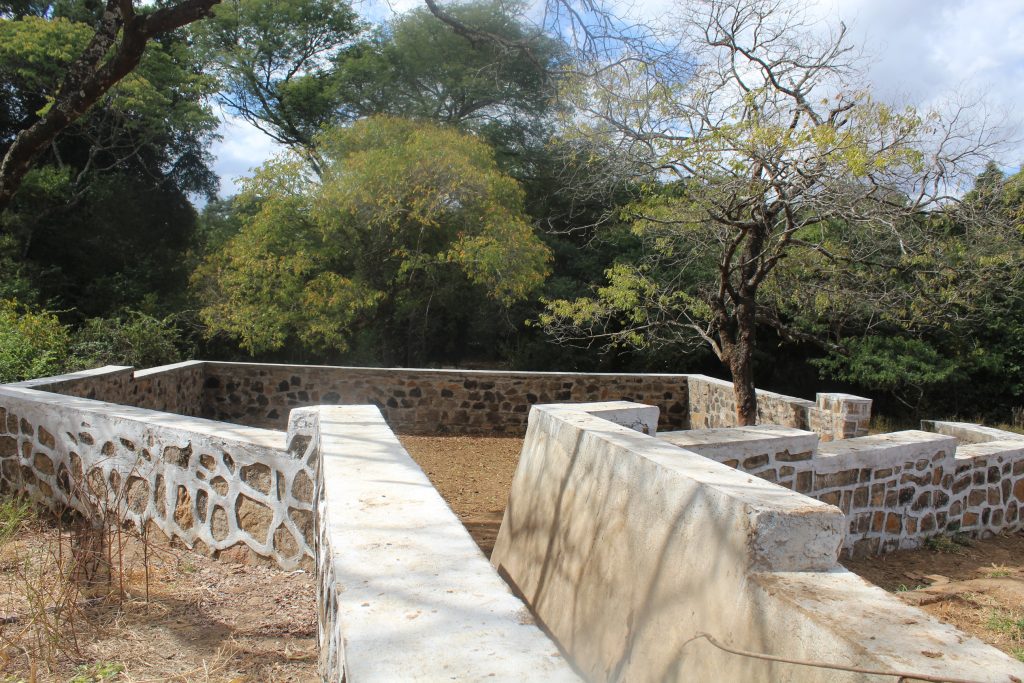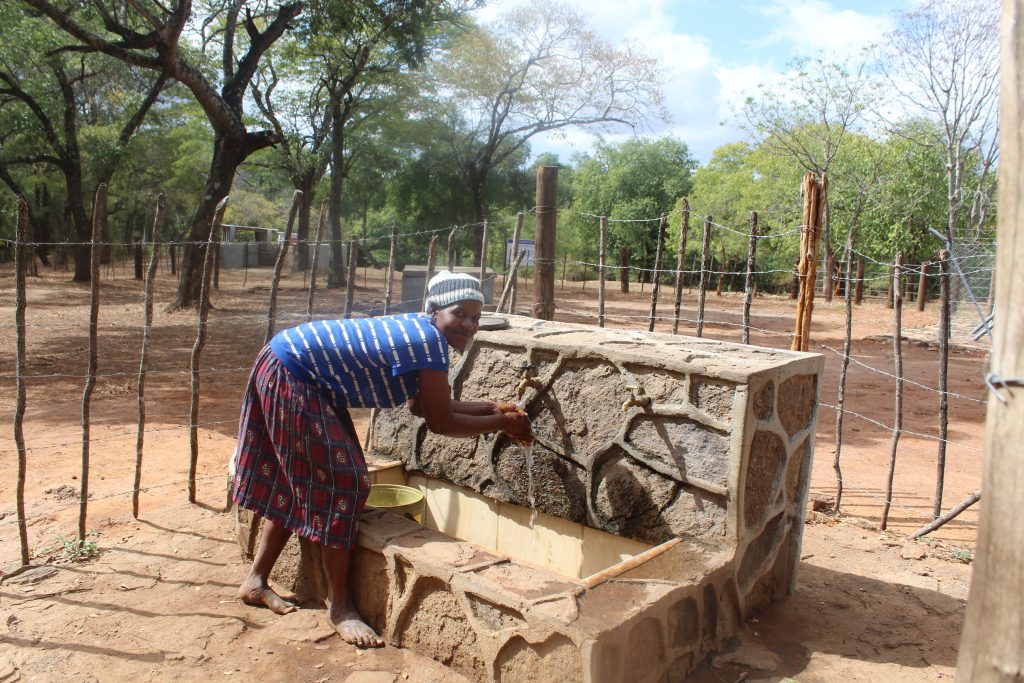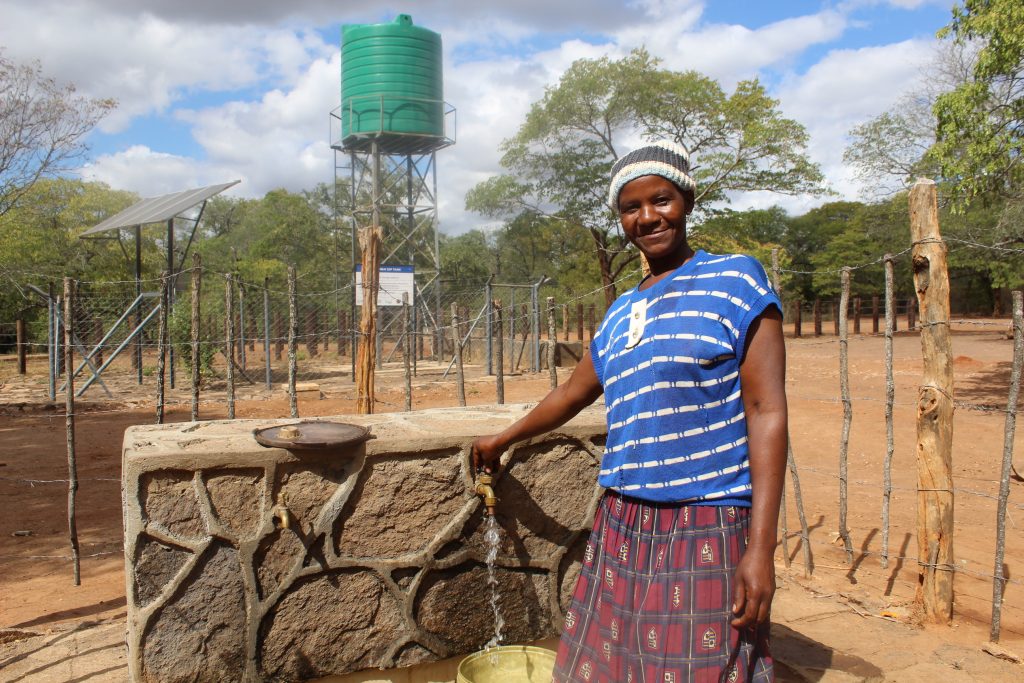by Maxine F. Kundishora
In rural communities, livestock management carries a hidden burden on the well-being of the people. The taxing traditional methods of fetching water for dipping tanks and the gathering of wood logs for the dip can be physically demanding, especially for women. The excruciating back pains from juggling livestock health, household duties, childcare and family life often leave rural women grasping at straws.
These were the chronicles of the villagers in Ward 17, before the repaired and rehabilitated Chitambai dip tank, which improved village livestock health and empowered women to be more productive with their time.
In the past, villagers relied on a wooden log structure for dipping their cattle. This system did not always retain water, necessitating collaborative efforts to gather more logs to seal the leaks. Villagers made multiple trips to fetch water from a dam approximately 150 meters away, navigating steep terrain to fill the dip ensuring that their cattle are fully submerged in the routine disease control. The process was labour intensive and strenuous for women, who already had numerous other duties.
“Life was tough in the past, we used to fetch 20-litre buckets, making 12 trips per household to fill the dip for our cattle to get dipped. Considering the dip tank’s holding capacity is 15000liters, it was a challenging task. Everyone with cattle from the village had to participate. It was saddening to watch elderly women lugging buckets of water, though they carried less buckets.” said Pamela Pasipawoma (42) a mother of 5 children from Ward 17.
Recalling the pain, Pamela sighed and said “Though it was important to take my cattle for dipping, as a woman it was unbearable. I would get home with excruciating back and head pains from crowning 20L buckets, only to be welcomed with more household duties.” The call for duty alternated from fetching wood logs for the dip and transporting water to fill it up.
What once was a struggle, took a turn with the 5-month project intervention by Africa AHEAD and partners, midyear of 2023. The dip tank repairs were funded by the United States Agency for International Development (USAID) and implemented in partnership with Action Contre La Faim, Nutrition Action Zimbabwe, Africa AHEAD and the Government of Zimbabwe. The project aimed at stabilizing crisis-affected and vulnerable households in Chiredzi district through strengthened livelihood.
The construction of the stone work dip tank has brought a ray of sunshine in the women of Ward 17, as their cries have become a thing of the past. The repaired Chitambai dip tank retains water efficiently, thanks to the water reticulation pipe linked to the newly drilled borehole, thus eliminating the need for women to manually transport water. The repairs enable cattle to be dipped effortlessly with water filling up without human assistance.


The sturdy stonework of the Chitambai dip tank.
“I am truly grateful to Africa AHEAD and partners. I can speak on behalf of the women in my Village to say now we have more time for other essential activities. Instead of waking up early morning to fetch water for the dip tank, now we can focus on other household chores and income generating activities such as gardening.” said Pamela.
The stonework can accommodate 30-40 cattle per session, catering for 6 villages with an estimated total of 1780 cattle from 130 households as at project completion period. In winter, cattle dip once every two weeks and once a week in summer to protect against tick-borne diseases such as heartwater.
“Since the construction of the dip, we hardly hear villagers complain about cattle deaths due to diseases in our village. Instead, we hear about such complaints from other villages, where they report their cattle falling sick from various cattle diseases.” said one of the villagers, Elastos Chionioni.

Improved facilities for healthier herds. The site of the repaired Chitambai Dip tank housing Ward 17 cattle for the disease control dip routine.
Africa AHEAD through the Chitambai dip tank project empowered women to enhance their livelihoods as the project has relieved them of the laborious burden, allowing them to invest more time and energy into gardens. As a result, the village women have been able to grow more vegetables and crops, generating income by selling their produce.
More so, the project not only halted environmental degradation but also promoted afforestation through community tree-planting initiatives around the dip tank site. “The project has had a huge impact on preserving our environment. Instead of cutting down trees to hold the water, which caused deforestation and degradation, the stonework dip tank has discontinued this practise.” shared Elastos Chionioni.
Additionally, Community Health Clubs were formed at the Chitambai dip tank site to strengthen health and hygiene practices and improve hygiene standards at household level. Pamela also explained that as a woman and a mother, she has always been worried about her family’s health. She was always concerned about drinking contaminated water from unprotected sources but she had no option. However, the dip tank has made a transformative impact on the community. “We can now drink safe water from the dip tanks, as opposed to the times we had to drink from the dam which was unsafe. We used to fetch drinking water from the same source as the community donkeys and cattle drank.” she said sounding gloomy.

Pamela showing off the clean water from the Chitambai dip tank.
The rehabilitation of the Chitambai dip tank stands as a beacon of transformative change within the community. It has not only streamlined women’s empowerment initiatives but has also significantly contributed to their overall health and well-being, as well as their families. Moreover, this intervention has paved the way for environmental preservation and more effective livestock management. The collective efforts of Africa AHEAD and partners have been a source of joy as evidenced by the heartfelt testimonies of the women in Ward 17. Moving forward, the women aspire to expand their gardening efforts and diversify crop cultivation for both household consumption and for commercial purposes, thereby enhancing economic stability.

